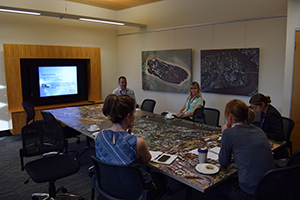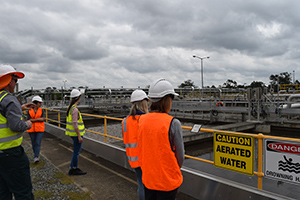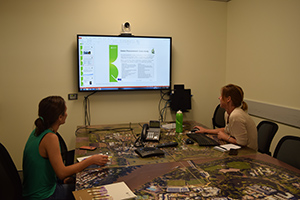Green Labs 2017 Update Sessions and New Representative Training
Each year, Green Labs representatives are given the opportunity to attend two update sessions delivered by UQ and industry experts. At these sessions, representatives are able to engage with other environmentally motivated UQ staff while learning more about sustainability in the laboratory and the wider workplace.
Sustainable Information Technology Solutions

The first Green Labs Update Session of the year considered the major role information technology (IT) is playing in improving sustainability at UQ. Guest speaker Todd O’Connell, Relationship Manager at Information Technology Services (ITS), explained three key ITS initiatives: saving energy, reducing waste and cutting down on carbon emissions. 'Follow me' printing was introduced in 2015 to avoid the problem of forgotten print jobs by requiring users to release their jobs at the printer with an ID card, and saved over one million pages in its first year alone. Zoom video conferencing was then introduced to reduce the need for travel between UQ sites for meetings, cutting down on transport energy and costs. Finally, the development of new guidelines asking staff to turn off their computers at least once per week not only saves energy, but ensures computers run more efficiently and are less vulnerable to malicious attacks thanks to regular updates. Due to the University-wide implementation of these ITS initiatives, energy and resources use have significantly decreased.
Tour of Oxley Creek Wastewater Treatment Plant

In October, Green Labs representatives and interested UQ staff were invited to attend a tour of the Oxley Creek Wastewater Treatment Plant for the second update session of 2017. Tour participants were shown the inner workings of the plant, which is rarely open to the public, and learned about the plant’s commitment to environmentally sustainable practices.
Urban Utilities’ Bill Collie detailed how the plant transforms wastewater into biogas, meeting 70% of the plant’s energy needs, with the energy captured from biosolids being separated from the wastewater. Because of their high concentrations of nitrogen and phosphorous, biosolids also make excellent agricultural fertiliser. Many local farmers now use biosolids from the Oxley Creek plant to fertilise their land.
Since the 2011 floods, the plant has increased its capacity to meet rising demand thanks to industrial and residential growth, and flood-proofing measures have been undertaken to ensure that vital electrical equipment is above the 2011 flood peak level. The key sustainability message from the tour was to avoid putting 'flushable' wipes and cotton buds down the toilet, as they can block pipes and ultimately end up in landfill. These items should be put in the bin instead, and reusable versions of disposable single-use products are preferred.
The tour concluded with the opportunity to ask questions and discuss the plant and its operation with the tour guide. The tour stimulated valuable conversation, and Green Labs representatives returned to UQ with a better sense of the workings of a waste water treatment plant and the implementation of sustainable practices. We thank Urban Utilities, Bill Collie and the staff at Oxley Creek who took the time to share their sustainability initiatives with UQ staff.
New Green Labs Representative Training

In 2017, the Green Labs Program held two training sessions, welcoming six new representatives from across the University. Four representatives joined from the School of Biological Sciences, taking the total number of representatives in that school to six. The Green Labs Program would like to acknowledge the School of Biological Sciences’ commitment to sustainability in their labs and thank its staff for their continuing support of the program.
A representative from the Moreton Bay Research Station was also welcomed to the program in 2017. Participating in the Green Labs Program will add to the station’s already well-developed sustainability practices. Another representative from the Institute of Molecular Biosciences joined the Green Labs Program, increasing the institute’s participation in the program.
At the first session of the year, Danielle Shaffer from Property & Facilities Energy Management team shared insights and advice on the energy reduction initiatives that can be adopted in the lab.
